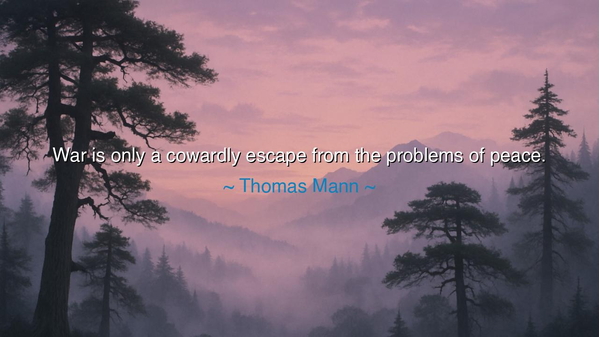
War is only a cowardly escape from the problems of peace.






"War is only a cowardly escape from the problems of peace." Thus spoke Thomas Mann, the great German writer, whose life was scarred by the upheavals of the twentieth century. His words shine like a sword of truth, piercing through the glamour and the false glory that men often ascribe to war. For war is not bravery—it is avoidance. It is the flight of rulers and nations from the hard labor of dialogue, justice, and compromise. The fields of battle may resound with drums and banners, but beneath it all lies the weakness of those who could not bear the burdens of peace.
The ancients, too, understood this. Did not Thucydides record how Athens and Sparta, instead of mending their grievances with wisdom, rushed to arms, plunging Greece into years of ruin? Their quarrel was not necessity but pride, their bloodshed not valor but failure. For the problems of peace—negotiation, restraint, humility—demand courage of a higher order than the swing of a sword. To sit across from an enemy and yield for the sake of the greater good requires a strength that few are willing to muster.
History is heavy with examples. Consider the First World War: Europe stood at the height of learning, industry, and diplomacy, yet a tangle of pride and alliances dragged millions to the slaughter. Leaders chose war because it was easier than the painful humility of compromise. The price of their cowardice was rivers of blood, the end of empires, and an entire generation lost. Truly, Mann’s words ring true: it was not courage that drove nations forward, but the inability to bear the burdens of peace.
And yet, there are those who have chosen the harder path. Nelson Mandela, upon leaving prison after twenty-seven years, could have sought vengeance. Instead, he bore the crushing weight of reconciliation. He chose the battlefield of forgiveness over the battlefield of violence. His courage was not to escape the problems of peace, but to face them, though they were bitter, slow, and fraught with struggle. By doing so, he turned away from the cowardice of war and became a beacon for the world.
Children of tomorrow, mark this lesson well: it is easy to destroy, it is hard to build. To raise armies is simpler than to raise trust. To burn cities is swifter than to heal divisions. But the fruits of war are ashes, while the fruits of peace, though slow to ripen, nourish generations. If you would be strong, do not grasp for the sword when disputes arise. Grasp instead for patience, for listening, for the relentless courage of understanding.
Practical wisdom lies before you: in your own conflicts—whether in family, work, or nation—resist the cowardly impulse to lash out. Do not treat anger as power. Instead, embrace the strength of addressing the problems of peace: honest conversation, compromise, and forgiveness. These are harder battles than war, but their victories endure. When you practice them in small matters, you prepare the way for greater peace in the wider world.
Thus, the teaching is clear: war is not the proof of strength, but the confession of failure. It is the coward’s escape from the duties of reconciliation. Thomas Mann reminds us that the noblest path lies not in bloodshed, but in bearing the immense, difficult, sacred burdens of peace. Take up those burdens, and you will stand taller than conquerors, for you will be a builder of a world where future generations may walk unafraid.






AAdministratorAdministrator
Welcome, honored guests. Please leave a comment, we will respond soon